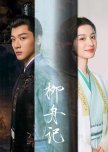
To Catch a Thief
Cui Xingzhou, the mighty Prince Huaiyang has been trying to catch a thief, the slippery bandit Lu Wen for some time. He stumbles upon a comatose Liu Mintang and like all princes, he simply cannot let sleeping beauties lie. Convinced she must be the beloved mistress of his nemesis, he rescues her intending to use her as bait. Conveniently, she has amnesia and mistakes him for her husband ! Thus this cold and formidable fief lord awkwardly assumes the persona of an indolent and not terribly successful merchant who dotes on his wife. Miantang's true colors emerge as a determined and capable business woman with an scary knack for turning hairpins into lethal weapons. It seems Xingzhou may have bitten off more than he can chew as it becomes clear Miantang has secrets and hidden depths that she herself barely remembers. Meanwhile his elaborate charade and lies keep snowballing until eventually half the town is complicit. What ensues is the kind of comedy of errors that arises when hero syndrome meets analysis paralysis. Complicating matters, her memory and past life catches up with them just as they both become invested in their fake domestic bliss and fall for each other. How will they to resolve their past grievances and make a life together as their true selves?What I appreciate most about this drama is both Xingzhou and Miantang are grey characters who have agency if not free will. They are well matched in terms of cunning, intellect, ability and ruthlessness. I enjoyed watching them work against each other almost as much as I enjoyed their working together. As someone who loves dark characters, I wish they toned down the comedy and dived into a darker and more passionate exploration of their undeniable chemistry and stunning visuals. While Zhang Wanyi is an exceptional character actor, comedy is not his forte. His expressions and delivery is almost too textbook perfect and his comedic timing lacks spontaneity. He pauses for too long to let the punchline sink in when he should keep going as the audience already got it and is waiting for the next joke. The humor is straightforward and not that sophisticated so it needs to unfold at a fast pace to hold audience interest. To speed things along, I watched most of this drama at 1.25 speed, something I almost never do. The comedy also masks that Xingzhou is quite a dark character that does controversial things to Miantang, manipulating her to the point of gaslighting. Zhang Wanyi could have pulled off a darker portrayal in an absolutely riveting and charismatic way so that is an opportunity missed. Nonetheless, he is compelling as a powerful and complicated fief lord who to his chagrin, falls in love with the enemy; a most unlikely and unsuitable woman.
Wang Churan is a vivid beauty and her comedic timing is more instinctive than Zhang Wanyi's. Her portrayal of the amnesiac Miantang is natural and charming. However, her character transitions after Miantang recovers her memory could be better written and portrayed. Part of the problem is in the novel, Xingzhou crosses some lines that he does not cross in the drama. Thus Miantang's rage and sense of betrayal is disproportionate to what actually happened. The stabbing scene was undeserved and this kind of violence is off-putting and has no place in a story where the couple is not breaking up for good. Beyond that, Miantang is a worldly character, a rebel who was on fairly intimate terms with Ziyu without much regard for her reputation. She played in the same sandbox with the big boys so it was baffling to see her go so full on girl angry at Xingzhou, who was just doing his job. These are mostly writing issues but there is also something lacking in the acting. Wang Churan was not able to reflect the character's evolution and approached it as if Miantang became a different person. There are unspoken ways to convey that at the core, Mianting is still the same Miantang; that the person Xingzhou fell for is still there. A more experienced actress would have used micro-expressions and subtle character traits to achieve this. And then just as inexplicably after the angst drags on long enough, she becomes sweet and forgiving domestic Miantang again! Since Wang Churan is new to lead roles and she is so lovely, I am happy to be forgiving. Nonetheless this diminishes Xingzhou as a character and made him appear no less a foolish, love brain than Ziyu. I am also left with a nagging concern that Miantang may be bipolar!
Even though this drama has some interesting and unique ideas and is refreshing in the way women are portrayed, I found it to be a bland watch overall. Despite some fun and memorable moments, the plot arcs are shallow and rehash well known battle for the throne tropes. Which is fine if the character arcs are well done but while the main characters are complex, they are dumbed down by the comedic focus. Miantang is inconsistently written; she starts out as a strong and independent woman who doesn't need to get married to have a fulfilling life. She abandons Ziyu's cause without a backward glance, abandons her revenge arc after a half-hearted attempt to infiltrate the palace, takes over an escort business before deciding she liked playing house best. At the end, I couldn't figure out what she was about. The character I enjoyed best turned out to be Shi Xueji. She finds so much joy in life's simple pleasures, is resilient and her quiet wisdom and dignity impressed me as much as Miantang's inconsistencies did not. I loved how the actress conveyed a layered character with deep and moving emotions via subtle expressions and a gentle smile that radiates with unbridled happiness. I also quite enjoyed Ziyu's character but the second couple was coma inducing and completely irrelevant to the story.
The drama finishes strongly at the climax in both the conspiracy and character arc but doesn't change the fact that despite its fresh premise it did not have enough substance to support 40 episodes. It would have been a more enjoyable watch at a tight 24 episodes or if they had engaged in a deeper and darker exploration of the characters. Nonetheless if you don't over analyse, it is very entertaining as a light romantic watch with phenomenal acting by Zhang Wanyi. My rating is 8/10 but I can see romance fans rating it a bit higher.
Was this review helpful to you?

Aged to perfection.
Since Love and Destiny was produced by the same team and resides in the same world, comparisons to TMOPB are inevitable. Pleasingly, the only connection is that it takes place earlier in the same 3L3W universe. This is efficient as less time is wasted on world building and explaining the tribes, hierarchies, time and other conventions. The story-line sticks to the 3L3W formula of an unforgettable love story that spans three lives and three realms. While TMOPB was an intensely passionate love story, this has more of a romantic comedy flavor. This is the story of a pure heart-ed young fairy who falls in love with the powerful and much older God of War. This relationship dynamic sets up for a different love story that again succeeds in delighting and captivating in a way that is now becoming a 3L3W brand.The plot is common for this genre (save the world or save the girl) and is this drama's biggest weakness. Those familiar with the director may observe the backstory of some leading characters (Jiu Chen, Ling Xi and Jing Xiu) were inspired by Journey of Flower - (Bai Zhihua, Hua Qiangu and Dongfang). That said, L&D is neither another TMOPB, nor JOF but a delightful story that stands on its own, albeit with a few cliche tropes. The three main arcs could have been better balanced - the first two took too long and did not leave much time for the final, most satisfying arc. There were too many (well executed) comedic fillers in this drama. This made it feel like "nothing's happening" or the relationship progressed too slowly.
The weak plot was compensated for by superb acting by the main leads. Veteran actors Chang Chen (Jiu Chen) and Ni Ni (Ling Xi) were perfectly matched. They are both gorgeous actors whose emotions and facial expressions transform and make them compelling in their appeal. The role of Jiu Chen was made for a Chang Chen that is aged to perfection - his sculpted bone structure and fierce expression exudes the aura of a stoic, mature and powerful God of War. Any suggestion that some young idol actor could have pulled this off is ridiculous. Jiu Chen is a formidable character that wears the lonely responsibility of keeping the realms safe. He moves mountains to force a win-win in his terrible conflict between duty and love. His instinct is to protect Ling Xi, to the fault of hiding the truth from her. He is alternately stern and helplessly indulgent with her. His impassive expression softens, he even smiles and becomes open and vulnerable only with Ling Xi. He is touchingly candid and unguarded when he confesses his feelings to her. With insight beyond her youth, Ling Xi recognizes the loneliness and burden inherent in Jiu Chen's role. She captivates him with her spell-blinding smile and mischievous antics; he is touched by her devotion and inept attempts to aid him. As their feelings grow, you can feel the invisible bond of their awareness and affection for each other. Ling Xi's best, most courageous moments are when she makes unbelievable sacrifices in order not to add to Jiu Chen's burdens. Each loves the other more than they love themselves.
In the first arc (20+ episodes), the Ling Xi wakes up Jiu Chen, who had been frozen for 50,000 years after sealing the Demon King. He is suspicious that such a weak fairy could have awakened him and takes her in, ostensibly to care for his health. The guileless and infatuated Ling Xi is delighted and disrupts his household with her comical attempts to entice him. She loses her senses over him and fires up his stone cold heart with her devotion. However, as God of War it is his duty to execute the young fairy with the ability to release the Demon King. Initially I found Ling Xi too subservient; a bird immortal with a bit of a bird brain. Yet Ni Ni's portrayal of Ling Xi was never annoying, indeed I was charmed despite my preference for stronger characters. She won me over when she bravely steps up to protect Jiu Chen and takes responsibility for her own life.
In the second arc (up to episode 50), Ling Xi is reincarnated as a mortal Lin Mo who has to go through three trials. She overcomes many challenges and becomes independent along the way. This is where Jing Xiu emerges as a manipulative, petty and sinister love rival to Jiu Chen. Episodes 30-40 can be skipped - this part was draggy and I struggled to empathize with Jing Xiu. This actor overacted the villain when he is actually supposed to be a grey character - he was so selfish, manipulative and creepy I was irritated at Ling Xi for not being wary of him. There were many unnecessary side characters in this arc that lingers too long on Ling Xi's coming of age. The best moments are between episodes 40-50 where Jiu Chen and Lin Mo fall touchingly in love (again). The final arc was the shortest and the sweetest. Ling Xi becomes a powerful high goddess who forces Jiu Chen to let her share his burdens and they face their enemy together.
The supporting cast was strong and there is a lovely secondary love story between Yun Fung and Qing Yao that is nicely intertwined with the primary. The villains did a decent job being evil and hateful but their motivators were typical: revenge, envy and obsessive unrequited love. The OST is very good but the CGI is quite dreadful. Overall a quality and enjoyable drama with a big budget. The bottom line remains as a love story, it boils down to the main leads. In this, they delivered - virtually all of their scenes brought a silly, lovesick and goofy smile to my face. You will enjoy this immensely if you appreciate leading actors and a love story that is truly aged to perfection.
PS - got a number of PMs re: comparison to TMOPB. I avoided directly comparing them but I also reviewed TMOPB and if you read that, what I think the differences are is obvious and reflected in the rating.
Was this review helpful to you?

Flower Power.
The Starry Love is a divine comedy packed with romance, sisterhood, friendship, adventure, mystical powers, and gut-busting laugh-out-loud moments. It takes dead aim at the tired, cliche-ridden xianxia formula. I was sold on both the drama and the female lead the moment she asks the most relevant question; after thousands of years, does the equipment still work? I laughed so hard that I fell off my treadmill. Be warned; it can be life-endangering to eat junk food or sip wine while watching this hilarious xianxia spoof.This story rehashes a well-known plot about mixed-up brides where two sisters end up with each other's intended. Born under auspicious omens, the elder, virtuous, and good-natured Princess Qingkui is engaged to the aloof and righteous Shaodian Youqin, Sky prince and protector of the realm. The ill-omened, defiant, and mischievous younger Princess Yetan is to be married to the ominous Void realm, where the unfavored, scheming, and ruthless third prince, Chaofeng plots against his brothers to be the next Void Tyrant. Through a comedy of errors, Yetan ends up in the Sky realm where she turns the world of the pompous Youqin upside down while Qingkui stupefies the nefarious Chaofeng with her goodness. Both couples hilariously discover that opposites attract and two wrongs make a right. All too soon they discover that they are twin flowers born from a sacred tree that can unleash chaos on the four realms. Can their flower power prevail over destiny or will their stories only be remembered by the starry skies?
The more familiar you are with common xianxia tropes, the funnier this drama is. The plot unfolds along recognizable lines, gobsmacking you with unexpected twists along the way. The sisters truly love and support each other and the friendships are genuine and tested by hardship and sacrifice. While there is a healthy dose of the genre-defining angst that made my eyes burn with tears, it is usually short-lived, turning into humor in the blink of an eye. This is a very self-aware drama that pokes fun at the absurdity of tired tropes by acknowledging that even invincible immortals fear death, that the Sky realm is a very boring place and most of the eye candy lives in the Void realm. While it is a humorous fresh take on the genre, the underlying messages about good and evil are all too familiar and there is not much substance to the story.
It is undeniable that the sis-mance and romances are the highlights of this drama. Each sister finds in her mate all the qualities she loves best in her sister! The sisters are loyal to each other almost ahead of their lovers and their men get it and accept that there are more important things than love. Newcomer Chen Muchi gave me palpitations with his sexy and charismatic portrayal of the duplicitous and manipulative Chaofeng. It was a joy to watch Qingkui awaken that spark of conscience that sets him on the right path without losing his air of devil-may-care wickedness. I was initially less impressed with Chen Xingxu's cliched and stiff portrayal of Youqin's stony indifference. But the way Youqin comes alive once that facade crumbles and how he shows us the many sides of Youqin - germaphobe, pyromaniac, mercenary, and playboy; once again attests to this actor's versatility and mastery. Chen Xingxu's and Li Landi's wonderful chemistry and the way they are able to play off each other's emotions and reactions are authentic and captivating. Li Landi is really a young actress to watch. Her Yetan is so brave, naughty, and infectiously bubbly that it is no wonder she had not just Youqin but the entire Sky realm at her feet. All four lead actors have excellent comedic timing and the impressive ability to pull off many simply uproarious lines with a straight face.
The biggest criticism I have of this drama is the overuse of bright lighting and the over-lit Sky realm. It makes for an overbearing visual experience that makes the back of my eyeballs feel like I have been staring down a torchlight. The production values and CGI are not the best and almost made me skip this drama, which would have been a mistake. Because it is addictive from the start and overall well-paced although it loses some momentum in the mortal realm before reaccelerating to the finish. The final arcs take on a more serious and angsty tone and the villains are a bit cliched and too easily identifiable. It also overuses the bad dad trope and some of the rationale of the Sky emperor in particular does not bear close scrutiny. Although many are not pleased with the ending, I have watched enough xianxias to expect something like that so it just made me laugh. I think it was quite comical and oddly fitting with the spirit of the drama. I am happy to recommend this as a very enjoyable light watch. I rate it 8.5/10.0.
Was this review helpful to you?

One step forward for mankind and two giant steps backwards for womankind.
This romanticized account of the life story of Xiao Yanyan, the accomplished Khitan Empress Chengtian (953-1009), gives voice to folk or unofficial history of her relationship with Han Derang. Wild history of their love affair survived over a thousand years and continues to fire the imagination of Chinese historians today.Please be aware of mild spoilers ahead (unless you already know the history).
It is known that Xiao Yanyan, was once engaged to Han Derang, who was from an elite Han Chinese family loyal to the Khitan rulers. According to the drama (which is based on a novel), her father chancellor Xiao Siwen and Han Derang help Mingyi (Emperor Jingzong) ascend the throne. Mingyi is sickly and his hold onto power is thus unstable; many branches of the royal family vie for the throne. Mingyi insists on marrying Yanyan so that like both his main rivals who married Yanyan's older sisters, his wife is also of royal bloodline. This kind of ill fated romance has limited appeal to most romance watchers and is an unnecessary digression for most historical or political drama buffs.
Although I was primarily interested in the history, Tang Yan and Dou Xiao's portrayal of the young lovebirds captured my heart and I was devastated by their forced separation. But alas their chemistry fizzles out later on in the drama and leaves me unconvinced that they are soul mates whose love is as deep or as epic as folk history suggests. At face, the bare facts are tantalizing - he shores up her regency over her young son Emperor Shengzong; is her trusted confidante and is highly ranked in her court; they may even have married and had a child together and; he was likely buried besides her. But in their more mature personas, both characters just seem sad, tired and lonely and not long lost soul mates who finally have their moment in the sun. It does not help that Tang Yan appears to have an easier, more natural chemistry with Jing Chao's Mingyi. To make matters worse, there are no nuances or subtleties in Yanyan's interactions with Mingyi and Derang that suggests they mean different things to her, that her relationship with and affection for each of them is not the same.
Mingyi is the most layered, complex and interesting character in this drama and probably one of the best grey characters I have seen this year. Although I resent his manipulation, his selfishness, his obscene sense of entitlement and his disingenuous excuses for doing terrible things, I also grudgingly empathized with him and the monumental task in front of him. Jing Chao really delivers one of the most convincing portrayals of a sociopath emperor who has the audacity to steal his best friend's fiancé and yet demands and expects them to protect his legacy. Unfortunately although she delivers a few good scenes, Tang Yan fails to evoke a strong and powerful empress who can rule alongside and then after the emperor. She cannot hold onto her strong moments, just defaults back to her comfort zone of a very beautiful and feminine woman that is to be rescued and protected. Her attempts at gravitas just results in a cold, aloof empress that doesn't allow any sparks to fly; even when she is free to be with the alleged love of her life. To be fair Tang Yan was pregnant during the shooting and that put limits on her ability to do the more physically challenging scenes but she still did not have to be written to be so mopey and passive aggressive.
The other magnificently and effortless acted role is Sheh Szeman's Xiao Hunian who is everything and more of what I imagined Yanyan would be. Her portrayal of a strong, yet feminine woman who bows to duty without wallowing in self pity; who is a fierce, strategic warrior that stands up to the menacing Yansage; who does as she pleases and shows her displeasure as effectively in words as in action puts Tang Yan's meek and insipid performance to shame. When Hunian tells Han Derang that it was just a twist of fate, else she would be just as great an empress, that resonates because art imitates life; a younger Sheh Szeman would have conveyed an unforgettable Xiao Yanyan. I did not approve of how the writing undermines Hunian in the final arc - even though Sheh Szeman got more airtime and had some awesome scenes, it was just not the right thing to do to the character.
While this drama as a whole does not live up to my expectations, I found many parts of it to be riveting. The power struggles and the battle for the throne are well written and shot but the story peaks at the Yansage arc. The battle footage and strategies used to route the enemy in this arc are bloodthirsty and exciting but is too early for the climax of the drama. To some extent that cannot be helped as it is the correct sequence historically. That said, after the Yansage arc, the focus of the story should shift from internal strife to external strife rather than focus on a series of much weaker, rather pathetic attempts at coups by the least interesting characters in the drama. It does little more than to drive home how hard it is for a widowed empress to hold on to the throne as regent without a strong military backer. It does highlight Han Derang's contributions and achievements as the unsung hero and the true power behind the Liao throne.
To me this is a 7.5/8.0 but I am going with 7.5 because I expected to watch a drama about a woman warrior who chose her country over her true love and then went on to make Liao great so that her sacrifice would be worth something. Instead, I may as well have watched her get her revenge on Mingyi by doing nothing besides get fat on sweet cakes and having flings with stable boys. But I learned many things about Liao/Khitan culture, including that Khitan women were very equal and progressive - they can get divorced, remarry if widowed, lead armies, hold positions and even rule in court. Which is really ironic because Mingyi's legacy Han reforms that were among Yanyan and Han Derang's greatest achievements basically Sinicized the nomadic Liao people to their vast benefit in terms of agriculture, language, culture and administrative and legal systems. But it also set Liao women back thousands of years in terms of the status and freedom. So what our warrior empress really achieved was one step forwards for mankind and two giant steps backwards for womankind. Maybe Tang Yan's portrayal wasn't that far off...
Was this review helpful to you?
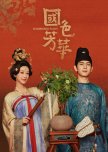
Fortune favors the bold.
Flourished Peony 国色芳华 is the first part of a sweeping two part story about a woman's quest to restore her mother's legacy and control her own destiny. It is set during China's cultural golden age when peonies were sought after as the "Queen of Flowers", a symbol of beauty and prosperity. He Weifang or Mudan (Peony) is a merchant's daughter with a rare talent for cultivating exquisite peonies. She is exploited by her grasping in-laws who have designs on her dowry and disdained by her husband Liu Chang, who pines for a county princess. She intrigues corrupt Flower Envoy Jiang Changyang when he overhears her wickedly praying her husband be plagued with piles, baldness, unfaithful concubines and bomb out in the imperial exams. Amused and empathetic, he helps her end her loveless marriage and finances her business ventures. Cheering her on from the sidelines, he lends the rare helping hand when she is in over her head. She gets him out of a tight spot and an unspoken trust, friendship and romance flowers between them.Mudan’s journey—from a submissive daughter-in-law to an independent businesswoman—unfolds amidst feudal Tang society, where class divisions, filial piety, and arranged marriages were societal constraints on both men and women. While the narrative highlights the systematic nature of women's subjugation and their lack of legal rights and agency, it is framed in the context of a feudal society where no one truly has free will. Thus, a promising scholar from an official family cannot hope to marry a county princess, a county princess can no more choose her husband than a merchant's daughter, and even an insouciant Flower Envoy must entertain a union not of his choosing. I really appreciate this kind of social commentary that is sharp, yet balanced and contextual.
Mudan has fantastic business instincts and is a confident, persuasive, and a savvy risk-taker that dares to seize the moment.She is ahead of her time and champions modern values in terms of women's rights and roles. While the obstacles women faced are realistically depicted, fortune favors the bold and Mudan overcomes them confidently and resourcefully. This kind of too capable, superwoman character would be suffocating and alienating if Mudan's resourcefulness and confidence were not also flaws that drive the plot. Anyone else would keep a low profile upon learning that Liu Chang and his dreadful parents are in Chang'an. Not Mudan!. With a misplaced sense of invincibility, she glories in her success and growing reputation, inevitably bringing herself to the vengful Lius and the jealous Youzhen's attention. Fear not, her plot armor is so thick that some poor patsy inevitably pops up just in time run into the white truck of doom for her! Thus she never truly suffers the consequences of her miscalculations and over-confidence.
Even though Sheng Yi's arc could have been tighter, her story is moving, realistic and compellingly portrayed. She is the most miserable and oppressed character in this story as a result of both her low status, her gender and her upbringing. Even though her actions are controversial and frustrating, I empathised with and rooted for her the whole way. Unlike Mudan, Sheng Yi is a product of her times; it is natural for her goals to be aligned with prevailing social norms. Whereas Mudan's modern values and opinions don't quite fit with the ancient Tang society. Sheng Yi makes a passionate case that not every woman wants or needs to be Mudan. Sadly, Mudan cannot fathom how given a chance to be free, a woman would choose to cling to traditional roles. Her tone deaf conversation with Sheng Yi where they both talk past each other highlights how two people can care deeply for each other without understanding one another. This is one of Mudan's blind spots as learning nothing from Sheng Yi, she blithely steamrollers Lv Gengchun into turning her medical practice into a for profit business.
This storyline unfolds at a slow pace that is barely noticeable as the atmospheric set and costumes, the rich dialogue and the tension between the deep and complex characters is immersive. Even though many plot arcs are quite cliche, the characters are captivatingly written, with flaws that can lead to significant setbacks and/or their downfalls. Both Liu Chang and Youzhen are insufferably arrogant characters who go to extreme lengths to get what they want only to learn they don't want what they get. Wei Zheming is persuasive as Liu Chang, an erudite but weak character who genuinely believes himself to be a better man than her really is. While the antagonists are smart or powerful enough to pose a credible threat, they spiral downhill into cliched obsessive archetypes for the convenience of the plot or to elevate Mudan or Changyang. But their stories are not over and there could be a reversal in the second part of the story that delivers a more nuanced and complex antagonist than what we have seen so far.
As someone who is no fan of romance, I find the delightful slow-burn connection between Mudan and Changyang to be the highlight of the drama. Unlike too many other stories that rush into love, this relationship develops organically and leisurely. The chemistry between Yang Zi and Li Xian is palpable and their bond feels deep, mature and authentic. They are both consummate actors that skilfully convey how their characters are savoring that delicious, giddy moment where they know they will be lovers but they are in no hurry to take that next step. Instead they are just basking in the strong foundation of their mutual trust and friendship while anticipating the passion that lies ahead. I love how Yang Zi has disappeared into this role and is not just Yang Zi being Yang Zi. And it has been too long since I have seen Li Xian's crooked smile and how he effortlessly conveys that there a lot more to Jiang Changyang than what meets the eye with just a few subtle expressions. I can't wait for the second part, which should reveal more of our enigmatic Flower Envoys and take his relationship with Mudan from confidantes to lovers.
The first part of the story ends somewhat anti-climatically with Mudan almost too effortlessly accomplishing what she sets out to do and with many sub-plots left open. The profound social insight, engaging storytelling and fantastic acting papers over some of the more predictable sub-plots. Unlike most empowerment dramas, it avoids separating the male and female lead but still indulges in some contrived plot points just to prove that women can make it with minimal help from men. Even though Mudan and Changyang's story is unfinished, I like it well enough so far to rate it an 8.5/10.0. If everything ties up well, my final rating for this story can be a 9.0 or even better.
Was this review helpful to you?
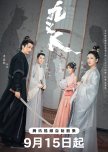
Those who seek revenge dig two graves.
This is a heartbreaking and sobering revenge drama about an ancient Me Too movenment by nine commoners seeking justice. The two main protagonists, Rulan and Meng Wan are apprentices at Yanyu Tower, whose exquisite embroidery are prized by the imperial palace. Underneath his polished and elegant facade, Yanyu Tower's proprietor and master embroiderer Wu Lian is the worst kind of predator; one who uses his power and privilege to repeatedly manipulate and abuse the young women working for him. When Rulan has the audacity and tenacity to seek legal redress, most including her bestie Meng Wan hesitate to help her; knowing how stacked the system is against them. Ultimately her plight and her conviction inspires nine people to devote their entire reason for existence to taking Wu Lian down and obtaining justice for Rulan and in some cases themselves. There are no fairytales in this drama; their stories are utterly devastating; alternately moving me to tears and making my teeth clench and my blood boil.This drama is not for the faint hearted and comes with a ton of trigger warnings. It is ruthless and brutal in terms of its scathing depiction of the unbalanced power dynamics between the powerful and the powerless. It convincingly articulates why regardless of consequences, Rulan, Meng Wan and their friends decide to take a stand against a clever, powerful and ruthless opponent. Their efforts are stymied at almost every turn and many of them pay the dear cost of justice. Wu Lian is almost too smart a villain and too well resourced. It is dismaying to see these nine avengers fall for the same traps over and over. In desperation, some of them take unnecessary risks and make terrible sacrifices with scant payoff in their attempt to gather enough evidence to indict him.
This is a large cast with consequential roles that deliver all around strong performances. Hu Yixuan's portrayal of Rulan's disillusionment, agony, bravery and forlorn quest for justice is harrowing, piteous and ultimately tragic. Wu Qian also impresses as the icily soft spoken, resolute avenging angel and mastermind of the revenge plot. As for Wu Lian, it is rare to encounter such an intelligent and downright despicable villain, masterfully acted by Qiao Zhenyu. All of the support roles come together well to paint a picture of common people from all walks of life with dreams and goals that get disrupted as they come together to get justice. The thief Li Chunfeng and the embroideress Jue Ming charmed and moved me into rooting for them most.
This kind of drama that tackles such a difficult subject matter is unlikely to appeal broad audiences. It is well executed for the most part but tends to be unnecessarily melodramatic in the later arcs. The villain origin backstory left me unmoved and is not convincing. I would expect Wu Lian's father's concubine to have impacted him in a more positive way. While this story ends in a realistic way, I am not satisfied. Wu Lian's enablers who covered for him repeatedly get off way too lightly. Finally the way this wraps up sends too strong a message that those who seek revenge dig two graves. Revenge becomes their sole purpose and end game to the extent that I wonder - did they really win? There is just too much collateral damage and sacrifice even though Humpty Dumpty can not be put together again. Maybe it would have been better to just live well. I needed to see at least one of the victims recover from this and go on to have a good life. The final What If episode 25 made me feel worse not better. I struggle with how to rate this. As much as I applaud the topic, the acting and how emotionally invested I got in the story, it left me with a hollow feeling after the ending arcs. It is still a good, thought provoking watch but I can only rate this a 7.5/10.0.
Was this review helpful to you?

No smiling matter.
Ye Pingan must be a witch. So whisper the common folk of Chang'an uneasily amongst themselves. Her medical practices are eyed with disdain by the ruthless and ambitious young magistrate Yuan Shaocheng. When she finds herself entangled in a murder, he investigates her unsparingly. To his chagrin, she manages to stay one step ahead of him. They are both complicated characters with dark histories and hidden agendas. They fall into an uneasy alliance where they use each other and inevitably start to uncover each other's secrets. The story is set in treacherous times during the reign of Empress Wu and at the pinnacle of the power struggle between the Li faction and the Wu faction. They are both mere ants caught in the crosshairs between powerful stakeholders. Thus their interests don't always align and they find themselves at times on opposite sides.This is a well paced, suspenseful plot-driven story pitting two smart protagonists, at times for and at times against each other. There are conspiracies within conspiracies that reveal an abominable, heart-wrenching secret that Ye Pingan vows to expose. The subject matter is no smiling matter; it is an unflinching depiction of the vilest form of abuse of the powerful against the defenseless. It is ironic that during the only time a woman ruled the world in Chinese history where at the upper echelons, women are as powerful and capable as men, at the bottom of the social strata they are weak and unspeakably abused. Led by Ye Pingan, the victims refused to roll over and play dead. Instead, they make terrible sacrifices to seek redress for what happened to them against practically untouchable antagonists. The way these damaged women bond and joy from their friendship and common purpose is the heart of the drama.
While there is undeniable romantic tension between them, Pingan and Shaocheng's relationship is more of a side story as they are both committed to causes that are larger than themselves. Even though I am normally not a fan of either Liu Shishi or Dou Xiao's acting, they are both well cast in their roles here and deliver mature and nuanced portrayals. Liu Shishi's taut, impassive expression and her cold, bright-eyed glare perfectly captures an avenging angel with just a hint of inner trauma. And Dou Xiao is the consummate ruthless, grey character who could be friend or foe... as long as he keeps his pearly whites hidden. Thankfully the somber tone of the story only allowed him to traumatize me twice with that killer 1,000 MW preternaturally white, extra toothy smile. That said, I found it hard to root for either of the leads. While I like that they are rather amoral characters who are in it to win it, they fight for other people. I find characters like Ni Chang or Wu Ankang who also know how and when to fight for themselves or when to walk away to be wiser and more relatable.
While I enjoyed the many twists and how the reveals build upon one another, the sub-plot arcs all follow the same formula so after the second arc, the reversals are predictable and anti-climatic. Nonetheless the drama held my interest to the end because of the entrance of the yummy Zheng Yecheng who delivers some exciting fight scenes. Not to mention I always enjoy dramas set during Wu Tzetian's reign and Chen Jin pulls off the role with gravitas and charisma. What I do not like is how these kinds of stories never fail to end without a dire message about the dangers of an over-ambitious woman.
Overall a sober story about lives lost in the name of vengeance and atonement, both ultimately hollow goals. Its a pretty good watch even though there really is nothing feel good about the story. I rate it 7.5/10.0.
Was this review helpful to you?
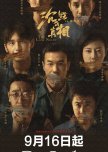
Scorched earth.
This is an artfully related dark crime thriller about a long, life blood sucking and soul destroying quest for justice. A body in a suitcase, a bomb scare, an incriminating old photograph and a looming terrorist threat captures headlines and puts acclaimed investigator Yan Liang on the case. He quickly discovers that these events are linked to a decade old cold case. The narrative navigates three time periods and alternates skillfully between the original team on the case led by prosecutor Jiang Yang (Bai Yu) and the present investigation led by Yan Liang as both investigations proceed down a parallel path. This is done so seamlessly it is not at all confusing; indeed all of the characters, events and clues flow fluidly and clearly. The pallete is sparse and dark toned consistent with the title and tone of the drama.While the mystery and suspense part of the drama is very well written and doesn't reveal itself too soon, this is really more of a character drama about Jiang Yang, a brilliant young prosecutor with a lot of fire in his belly. Without a doubt, this is Bai Yu's best acted role to date. His signature gigantic forehead was so well concealed I didn't recognize him for awhile. The way his Jiang Yang's indomitable idealistic youthful spirit is extinguished into a subdued, quiet desperation and almost but not quite defeated acceptance is one of the most moving and nuanced portrayals I have seen in a long time. He deserves to win awards for this role. I wish I could say the same for Liao Fan's Yan Liang but I was not wowed by his crime solving brilliance which is supposedly signified by pondering and obsessive ball bouncing. Despite some failed and misplaced attempts at humor, Yan Liang's present day team also lacks the rapport and chemistry that oozes out of Jiang Yang's "hot pot" team. Anchored by Bai Yu's powerful performance and a solid cast overall, there is still an unbalanced or somewhat lacking feeling. This is amplified by the fact that the adversary is just powerful with unlimited resources and tentacles everywhere. There is no well developed mastermind at work - all we see are a bunch of petty villains who employ rather crude tactics to suppress the truth.
The drama peaks at the end with the final reveal in a truly masterful and heart wrenching performance by Bai Yu. Yet I am left feeling unsatisfied; I am missing the satisfaction of a showdown and fitting consequences for the villains. Indeed the repercussions seem far worse for those who resort to scorched earth methods to uncover the truth. Thus to me, this is a dark drama - it far from glorifies the quest for the truth and justice. It leaves a lingering sense that it is far more worth while to just live a good and happy life.
This is an excellent watch but be warned, it is dark and sad. I don't consider it to be quite in the same league of the Bad Kids and give it an 8.5.
Was this review helpful to you?
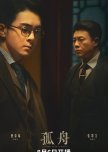
Strong on character but short on plot.
A Lonely Hero's Journey is about a young man's brave and lonely resistance to Japanese occupation. It is set in Suzhuo in 1941, just four years before Japanese forces withdrew from China. At the time, Suzhuo was administered by the Wang Puppet Regime; which was formed by a faction of the KMT that defected to the Japanese. The Wang Regime called themselves peace seekers and didn't have much authority but are regarded as traitors in history. While Suzhou was not the epicenter of resistance against the Japanese, it is a gorgeous and culturally significant historical city in China. This drama highlights the scenery, architecture and culture of Suzhou, including authentic famous Suzhou ballads. Its not your typical highly trained spy vs spy espionage story but rather about the defiance of ordinary people.Gu Yizhong is a Western educated architect and the young master of the prominent and patriotic Gu family in Suzhou. On a rescue operation went awry, he gets framed as a Japanese traitor and is isolated and condemned by friends and family. He infiltrates the Suzhuo Secret Service station run by Zhou Zhifei to find out who the real traitor Cell 8 is. Zhifei of course knows who the real Cell 8 is and doesn't trust him for one moment. Zhifei and Yizhong are parallel characters that at a high level, share a common hatred for the Japanese. As individuals they are pushed to make difficult choices at pivotal moments of their lives. To survive they both have to be flexible; sacrificing a father, or a a son and their first love. Somewhere along the way Zhifei lost himself and became corrupt whereas Yizhong manages to hold on to his beliefs. In Yizhong, Zhifei sees the better man that he could have been but is not. In the guise of a mentor, Zifei goes after him like he is exorcising a ghost; destroying all that Yizhong values to bring about his moral downfall. Zhang Songwen is compelling as this selfish, dark and diabolical character, who occasionally allows glimpses of his lost humanity to shine through in his dealings with the two women he loves, his son and his mentor Mr Li.
This drama is very well cast and in addition to Zhang Songwen, is anchored by impressive portrayals by veteran actors Zhang Fengyi and Zhang Yao. In fact I think Zhang Fengyi's Gu Xixing stole the show. The drama starts to go downhill when Xixing exits and completely falls apart after Ou Xinping exits. The younger cast also delivers credible performances against the older actors. At times, Zeng Shunxi's portrayal lacks intensity and could be nuanced with inner conflict when it comes to how he feels about Haimo and Ruotong. Instead, he gives us nothing there so the way they ended left me scratching my head.
One of the best features of this story is how strong all of the women are in their own ways. Ou Xinping is not just a survivor, she is a killer with immovable convictions. Zhang Haimo is cool headed and calm, someone who is motivated by personal connections and loyalty rather than ideology. Unfortunately Haimo's character is destroyed after her walk away is walked back almost as an after thought to try to salvage the shipwreck of a storyline. This is Chen Duling's best role to date and I must commend her effort in even matching the lip movements of the very hard to sing Suzhou ballads. At sharp contrast is the passionate Xiao Ruotong who is far more emotional and willing to sacrifice for her ideals. Wang Yuwen's acting feels very genuine, evoking a moving picture of a young girl somewhat overwhelmed by the tide of history.
Despite wholehearted performances from the cast, this drama is strong on character but short on plot. The plot arcs lack logic and don't hold up well against close scrutiny. It is debatable whether Yizhong needed to make such immense sacrifices to isolate himself as a lonely boat that infiltrates the Suzou Bureau. His codename 孤舟/Gū Zhōu or Lonely Boat is too close a homonym to his surname Gù/顾 he may as well advertise that he is the CPC spy. The identity of Cell 8 is too obvious, diminishing the sense of suspense and is uncovered without much help from him. I was ready to fling my wine at the TV when the enemy simply allows Yizhong to walk away with the only key piece of military intelligence he obtained because he shamed his country for occupying China! After Japan lost WW2, it was absurd that Zhifei still stuck around simply to try to frame Yizhong rather than fleeing like the rat he is. But I guess in these kinds of stories the bad guy doesn't get to sail off into the sunset with his ill gotten gains. This is one of those dramas that can only be enjoyed if you watch the character stories and completely turn off your brain when it comes to the plot.
Even though this starts well and the acting is good, it starts going downhill just before the halfway point. I can only recommend watching this if you are a fan of any of the main actors or if you are interested in Suzhou culture. If not, there are too many better Republican spy dramas out there with tight and suspenseful plots. My overall rating 6.5/10.0.
Was this review helpful to you?
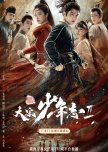
The father, the son and the holy sheep.
After a long hiatus, Young Blood 2 picks up right where Season 1 left off with the team heading to Western Xia to rescue Zhao Jian's father. There they get embroiled in a plot to assassinate Yuan Hao, aka Emperor Jingzong of Western Xia. Yuan Hao was a formidable general and founder of the Tangut dynasty, which lasted almost two centuries. This narrative largely respects history so if you do not want to be majorly spoiled as to how this ends, resist the urge to Google him.Initially, Season 2's somber, pensive tone took me aback. But it is fitting for the desolate, rugged, mystical Helan Mountain terrain. It also ties well with the personal losses, betrayals, and disillusionment the team experiences at the end of Season 1. While screenwriter Wang Juan's humor and clever dialogues are evident in the writing, the difference in the directing team is noticeable. Character shots and comedic moments are not as well captured by the camera. Many of the people shots are not filmed at interesting camera angles and the main cast's humor does not flow naturally. The actors may be trying too hard to convey that some of their joie de vivre have faded after all that they've been through. Their energy often seems lethargic and their banter is lackluster despite the witty dialogue. What still shines is their unspoken affection and trust in each other which seems more mature, time-tested, and unbreakable. The "new" Yanei integrates well even though he unavoidably looks younger and is missing the swagger. Su Xiaotong's acting has most visibly improved and I enjoyed Pei Jing's growth this season.
In terms of comic relief, the antagonists steal the show in Season 2. The humor in their dialogues, the bald-faced lies traded with deadpan expressions among the Western Xia royal family had me in stitches. But it is the oddly gullible, absurdly superstitious, and unexpectedly sincere Yuchi Yuan that made me laugh hardest only to cry hardest when he admits he is someone that just needs to believe in divine intervention. Many supporting roles like Yuchi Yuan, the heroic Section 8, and the antagonists are so well written and dimensioned that they are the show stealers. Not only does Section 7's banter seem to lose its mojo, they also don't get to do the important tasks in the mission, other than show up for the finale. Indeed the main architect or spymaster is not from Section 7.
This season, most of the main characters grapple with the kind of person their father is, what he expects of them, and whether that is compatible with who they want to be. To different degrees, each parent and child take a measure of one another and don't quite like what they see. Yuan Zhongxin's dad may be a particularly nasty, cold-hearted, and misguided sociopath with questionable methods; but ultimately he wants his son to survive. This is not the case with Yuan Hao, who is the biggest, baddest, daddy of them all. Thanks to Hai Yitian's intimidating screen presence, Yuan Hao is a terrifying freak of nature, a giant rock formation that must have been hewn out of the sacred mountain itself. Just his menacing, diabolical appearance made me break out in cold sweat. Yuan Hao knows exactly what his son is up to and he gives him every opportunity, practically dares him to succeed. The dialogue within the dialogue and the dark humor behind barely veiled threats that petrifies poor Ningling Ge out of his wits is signature Wang Juan. I never felt more sorry for such a vile and duplicitous character; an apple that falls far, far from the tree. He seems diminished and less smart in Season 2, over-shadowed by the larger-than-life Yuan Hao. Father and son are both oddly pitiful to me as their story as recorded in history is already wildly dramatic and treacherous.
The plot is tighter and more focused than Season 1 because there is only one mission that spans several years with a time jump that interrupts the momentum slightly. The sub-plots are cleverly structured around the interplay of recurring themes around the father, the son and the holy sheep. At the time, the Tanguts practiced folk or natural relgion steeped in mysticism with shamans, and many spirits or gods. Like many ancient cultures, they believed that the ruler is divinely blessed but in times of chaos or natural disaster, can lose the mandate of heaven. In planning the mission, the yummy Wen Wuqi of Section 8 infiltrates Western Xia by assuming the identity of a sheep deity's envoy come to anoint Yuan Hao's regime. There are many allusions to fēngshén/封神 or the creation of gods, which is the underlying strategy the Song spies use initially to elevate and then subsequently to undermine Yuan Hao. Wang Juan's well researched and superbly written script clearly draws inspiration from Fēngshén Yǎnyì 封神演义 or The Investiture of Gods one of the great vernacular novels about Chinese history, mythology, folklore, fantasy and legends.
The ending will not come as a surprise to anyone who knows the history (or used Google). Even then, the finale delivers an epic showdown that the entire season builds up to. The fast paced and thrilling action choreography is one of the highlights of Season 2. The desperate, bloodthirsty and stunning final fight had me squealing, jumping up and down and bouncing off walls with adrenaline fuelled fear and excitement. I personally would have ended the story at the mid-way point of the final episode, where the ending credits roll. It is fitting and exactly the kind of irony, cynicism and dark humor I expect of Wang Juan. But that would have resulted in an outcry of gargantuan proportions and I equally enjoyed the final message that a father does not have to explain himself to his son. Despite the fantastic writing, I still wish the original team's chemistry worked a bit better. So for me, this was mostly tracking just a bit better than an 8.0/10.0 but I think ending a drama well is super important and I like the ending so much so I am happy to bump this up to an 8.5/10.0.
Was this review helpful to you?
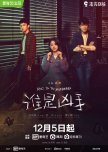
Cop out.
Despite a strong start, Who is the Murderer? deflates into yet another over-hyped and ultimately mediocre production in the 2021 Mist Theatre (soon to be known as Miss Theatre) lineup. This kind of simple and straightforward plot around the hunt for a long hidden serial killer relies heavily on good execution to impress. I don't know if it is an indictment of the competence of the Chinese police force but practically every Chinese crime thriller revolves around a stone cold case and the lamentably long road to justice.The lives of the three main characters collide when young Xiamu's foster mother is murdered by a serial killer. A fatal moment of weakness by then newbie cop Leng Xiaobing enables the murderer to escape with collateral damage. Teenage Shen Yu's father disappears without a trace after appearing near the scene of the crime. Seventeen years later, the revival of this cold case entangles Shen Yu, Xia Mu and Xiaobing, united by the scars from the past yet divided by different and at times conflicting agendas. Without a doubt all three leads deliver stellar performances as characters who all experience a shattering personal loss from this common event which shapes them in very different ways. Overall I found Xiao Yang's portrayal of the gruffly amiable but subtly guilt ridden Leng Xiaobing most natural and convincing. While both Zhao Liying and Dong Zijian delivered intense and very well acted portrayals of Shen Yu and Xia Mu, they erred on the melodramatic side with excessive posing.
One of the big issues with this drama is that the suspense does not arise from the plot itself but is heavily contrived, induced by background music that accompanies angsty and heavy dark posturing by both Xia Mu and Shen Yu that goes absolutely nowhere. While compellingly acted Xia Mu's PTSD is out of proportion to the trauma he experienced and after a lot of build up and suggestive behavior, this character just gets side-lined and he is bafflingly short changed in the final showdown even though he is on the scene. While Zhao Liying's impressive portrayal of the cold, creepily inscrutable and sociopathic Shen Yu exceeded my expectations, the plot again simply fails to rise to the occasion when it comes to her story either even though she hogs the final confrontation. At the end, I feel both characters led me on a merry chase, teasing with suggestive dialogues and actions that ultimately never fully plays out. It is very frustrating because this setup and the story could have gone down many more intriguing paths with thrilling and shocking outcomes but after setting it all up, the writer pulls a much bigger cop out on us than Xiaobing's pivotal gun shy moment.
Reminiscent of The Pavilion, the plot gets hijacked by character explorations that not only don't advance the plot, they distract from it with artificially induced suspense. This led to my greatest disappointment in the way the murderer is introduced and revealed. It completely violates the unspoken bargain of giving the viewer a sporting chance of identifying the murderer. The murderer falls far short of that lurking evil presence that creates an aura of danger around the main characters and their motive is a big yawn. This does not by any stretch of the imagination qualify as a whodunit, it is at best literally a spoiler homonym of a whodidit. Bottom line, this is little more than a very unremarkable investigative crime thriller so if you were looking forward to playing armchair detective, look elsewhere. The further extension of the mundane plot with non substantive filler episodes that introduce unnecessary characters further irritated me when I would have preferred to better understand what happened to Xia Mu's foster mother as well as Shen Yu's father. The fact that the only character I cared about was Xiaobing's (hot cop) friend at the beginning says it all about how big a fail this is.
I can only rate this a generous 7.0 out of 10. I waited to write this review because right after the ending, my very incensed mother was leaning on me not to rate this better than a 5.0.
Was this review helpful to you?
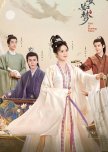
May the baddest man win.
This is the drama adaptation of a popular female harem web novel "Kun Ning" (坤宁) by Shi Jing (时镜) with an interesting approach; readers voted on who the female protagonist ends up with. It is a dark and gripping tale of intrigue, conceit, betrayal, revenge and redemption. Jiang Xuening is the alluring but resentful, selfish and ambitious daughter of a court official who ruthlessly parleys her charm and cunning into becoming empress. Her schemes lead to the downfall of the royal family and the ruin of both her childhood sweetheart Yan Lin and the erstwhile incorruptible Zhang Zhe. Desperate and full of regret, she barters her life with the blackbellied Xie Wei to save Zhang Zhe. She finds herself reborn as her 18-year old self with a chance for a do-over. She vows to do better this time, to steer clear of the bastions of power and the malevolent Xie Wei. She tries to use her preternatural knowledge to save Yan Lin and Zhang Zhe from their sad fortune. As she embarks on a journey of atonement, she discovers there is an element of destiny that pulls her towards the center of power. This time, with greater wisdom and insight, she uncovers hidden secrets and unexpected allies that help her better grasp the intrigue unfolding around her. Is that enough to change their destinies or are they doomed to the same tragic fate?This story explores the causal links between the past, the present and the future.; the idea that if only knowing what we know now, we can go back and do what we should have, could have but did not do. It begins with a Ning'er who is already a fully realised character that is not yet revealed; a charming beauty who had the world at her feet and lived a wicked and self-indulgent life. Even though Ning'er's goals change, her innate nature stays the same. The past is told in flashbacks just before the moment plays out again in the present. This works in terms of the more detailed plot points but dilutes the character and relationship stories. Thus while Bai Lu pulls off her role well overall, the piecemeal telling of the backstory doesn't capture the depth of Ning'er's regret or the layers in her relationships with some of the main characters.
Where the storytelling falls short is in Zhang Zhe's arc. To me, it is the most pivotal love story in the drama. He was the best of men, a morally upright official who betrayed his principles for her. And she was a selfish person who was so moved she became selfless for him. Their emotions were so powerful it pushed them both outside of themselves towards a mutually destructive outcome. Sadly unlike the novel, their do-over relationship is shallow and barely scratches the surface of the unfinished affinity between them. It's a pity that instead sticking to the novel which better fleshes out this arc they wasted a bunch of time on the nasty Consort Shu's boring and tropey petty antics. Wang Xingyue delivers such an empathetic portrayal of Zhang Zhe that I was disappointed his character was short changed by the narrative.
As for Xie Wei, I have a weakness for unapologetic, unspeakably damaged, vengeful and morally ambiguous characters like this. Zhang Linghe delivers an intense portrayal of this dark and complex role. Although he overdoes some of the snarls and sneers, his performance overall deserves praise and is his strongest to date. Every time the full fury of Xie Wei's fiery death glare flashes across the screen, I go weak at the knees and my brain turns to mush. Yups, I am definitely a "may the baddest man win" kind of girl. Xie Wei is far from the best man but they are well matched, morally flexible ends justify means kind of people. Their romance arc only takes off later on but it is worth the wait. A mutual understanding develops gradually between them before things get really hot and steamy. When it does, their audacious chemistry explodes in a way that sets a new bar for passionate kiss scenes going forward.
Even though the political conspiracy is not that complicated, it is well told and riveting. Xie Wei's origins are a bit too obvious early on but I enjoyed how Ning'er and Xie Wei work together to uncover the conspiracy. They are both diabolical in how they manipulate the different factions around like chess pieces. The villains are no pushovers but they are overshadowed by the force of nature that is Xie Wei and Ningér's combined dark ruthlessness. This is not an action heavy drama but all of the fight scenes were well shot. I particularly enjoyed the vicious ferocity and absolute glee with which Yan Lin cuts through a melee. I hope this fight maniac Zhou Junwei's small indiscretion does not stand in the way of future roles in action intensive wuxias. Outside of one unnecessary and infuriatingly gratuitous death, the drama ends on a strong note after a bloody, intense and thrilling showdown.
While I enjoyed this drama immensely, the storytelling left me vaguely dissatisfied; as if I only watched the cliff note version of a story that had a lot more depth, nuance and substance than the drama managed to convey. This director is not great at knowing which plot arcs to give more weight to and has an unfortunate predilection for over-bright spot lights and spinning cameras. The production values are mediocre at best. This is a story that had so much potential it deserved to be in the hands of a better director and a better budget. I still rate this a highly reccomended 8.5/10.0.
Was this review helpful to you?

A cacophony of crows.
The Story of Minglan is a leisurely and meandering account of how with patience and cunning, Sheng Minglan, the low born daughter of a concubine triumphs over many challenges to achieve both personal and social success. Minglan's father is a middling court official who over indulges his favorite concubine and allows her to turn his household upside down. The petty tyranny of harem rivalry leads to tragedy and Minglan ends up being raised under her grandmother's wing. Minglan's great misfortune has a giant silver lining because this formidable old lady is a force to be reckoned with. She sees to it that Minglan is well schooled and helps her navigate the many pitfalls of harem politics. Minglan blossoms into a quietly underestimated young lady who catches the eye of the most eligible bachelors despite her low status.This drama digs deep into what lurks beneath the genteel façade of Confucian propriety among the status conscious Song dynasty nobility. The deceptively sedate, mundane, humdrum of women living lives of quiet desperation, occasionally broken by shrill outbursts that crescendo horrifyingly in a cacophony of crows. My eardrums barely survived the assault of this panoply of nasty, caterwauling women. The early arcs on Minglan's childhood and coming of age are the best, most empowering ones. The drama climaxes at her vengeance arc, where I found her quiet scheming and utter ruthlessness chilling and impressive. After that the domestic bliss arcs drag on far too long with the couple dealing with repetitive villains with all too similar modus operandi. We really did not need to see version 2.0, 3.0 etc of essentially the same not very smart wicked women archetypes that are too handily dealt with by our power couple.
Zhao Liying delivers a credible portrayal of a docile, Song dynasty noblewoman with hidden depths. The way she digs into you with her eyes, the fleeting cunning smirk and brief flash of fury in her placid gaze foreshadows her evolution into a full-on temper tantrum throwing wife! That said, Zhao Liying is still best at fierce roles rather than as a docile still waters run deep kind of character. Zhao Liying and Feng Shaofeng paint the perfect picture of domestic bliss.Their chemistry is that of a long married couple in harmony and less of the sizzling kind that flared up between her and Lin Gengxin in Princess Agents. It is rare to see Zhu Yilong in a costume drama and I felt real sorry for his Qi Heng who unlike both Gu Tengye and Sheng Minglan, has no free will as he is unable to free himself from the social strictures of his time. The cast overall is very strong with many veteran actors that deliver comical parodies of the ridiculous pretensions of the Song aristocracy.
I am afraid I did not enjoy this very well made drama as much as many other people did. The 70+ episode narrative goes on for too long, conveying an unnecessarily realistic impression of how suffocating it was to be a Song dynasty woman. Considering Gu Tingye's incredibly modern attitudes with respect to polygamy and empowering his wife, I am convinced it was impossible to be a Sheng Minglan in those times. Some of the early arcs are worth 8.5 but the story climaxes too early and is bogged down by repetitive plots in the latter half. This weighs my overall rating down to 8.0. This is a drama that patient viewers with robust eardrums will enjoy more.
Was this review helpful to you?

The Virtuous Husband.
In this witty satire, a modern business man finds himself in ancient China where he is Ning Yi, a soon to be zhui xu/赘婿 or matrilocal husband to Su Tan'er, the heiress of a wealthy cloth merchant. Using modern business methods, he hilariously wins his Tan'er's heart and mind as they take down internal and external rivals together and he proves his worth beyond being a useless kept man.The wicked role reversals as Ning Yi and Tan'er navigate their marriage made my shoulders quiver with laughter, especially the darned Academy of Male Virtue. I love the way Ning Yi is written in this drama - he is cunning, compassionate, innovative, ruthless and far from the virtuous husband, he is the academy's most farcically subversive element. Guo Qilin and Song Yi sparkled together, transitioning seamlessly between brilliant comic timing and repartee, heart stopping action and moving emotional moments. The colorful ensemble characters, friend and foe alike are well dimensioned and written and acted with verve and audacity. The humble Guard Geng with a big heart and big dreams is my favorite supporting character.
I thoroughly enjoyed the first half of this drama, which is easily a 9.0+, the second half is noticeably loses its mojo and is at best a 7.5/8.0. The decision to back burner both Tan'er and Guard Geng would have been fine if comparable new characters stepped up to fill the void. Unfortunately while Xigua starts out as a powerful and interesting character, she becomes pathetic. It does not help that while she is lovely and likable, the actress Jiang Yiyi is miscast here - she not funny and has little chemistry with Ning Yi/Guo Qilin. Ditto for his shifu and the creepy Lou Shuwan; I didn't really see the point of either character. The drama only picks up again when Guard Geng and Tan'er re-emerge and our power couple is reunited. This makes it obvious that despite Guo Qilin's undeniable talent, he cannot pull off these uproarious moments when he is not lined up with the right team.
Similarly, the antagonists in the first arc are very comical but in the bandit arc, the villains were mostly trying too hard to be humorous caricatures. The attempts at comedy are also often at odds with the heavily political and increasingly complicated plot line, one that leaves scarce room for Ning Yi the maverick to save the day. The story also takes a darker and more cynical turn and even though Guo Qilin impresses with his ability to make me feel the weight of his loss and cry alongside him, the drama ends in a way that does not leave me thirsty for the heavily hinted season 2.
Overall I rate this a 8.0. I would recommend dropping after completing the much more outstanding first arc.
Was this review helpful to you?

Creation of the Gods Ⅰ: Kingdom of Storms
26 people found this review helpful
Sons of a tyrant.
Wuershan's Creation of Gods trilogy is the culmination of an eight year labor of love that is the most ambitious and grand scale adaptation of Chinese classic Investiture of Gods ever. This Homeric, often chaotic tale of gods, demons and men that blends speculative history with myth and legend is probably the most widely adapted ancient Chinese vernacular novel. This grandiouse, exhilarating, action packed, and painstakingly crafted production is a visual triumph and an immersive adventure that is best experienced on an IMAX screen.Kingdom of Storms is the first instalment that focuses on the origin story of the King Zhou of Shang and how he incurred the wrath of the heavens to the extent the gods intervened. In a departure from canon, this adaptation does not lay the moral decay of King Zhou solely at the door of the hedonistic, fox jezebel Su Daji. This version holds King Zhou accountable, clearly asserting that his ambition and moral flexibility already put him on the dark path from the get go. This is a more layered and manipulative King Zhou, who adopts all of his noble hostages including Ji Fa as foster "sons". He ruthlessly indoctrinates his own son Yin Jiao as well as his hostage sons into choosing to be sons of a tyrant over their own fathers. All of the sons are pushed to decide whose son they really are and what kind of man they wish to become. This recurring theme of conflict between father and son and right and wrong adroitly weaves most of the sub-plots together.
Kris Phillips with his magnificent build and his imposing, quietly menacing , almost mesmeric screen aura is impeccably cast as King Zhou. He so much looks and breathes the part that it is easy to ignore his at times bizarre Mandarin and the occasionally stiff acting. Although the stunningly gorgeous Naran is bewitching as Daji, the role lacks complexity. She doesn't get to do much more than alternate between a sensuous seductress and a cunning and feral animal spirit when cornered. This debouched couple lights up the screen with their dark chemistry but I could have done with a bit less of their wanton cavorting that comes off as too unsubtle Hollywood. Beyond their honed physiques and stunning atheleticism, both Yu Shi's Ji Fa and Chen Muchi's Yin Jiao won my heart with their brotherhood and their portrayal of initially bewildered and disillusioned sons who grow up to become fearless and resolved men. They stand out among the dazzling number of up and coming young actors who managed to make an impression in this whirlwind production as does Ci Sha's not so hot headed Yang Jian. The deities don't feature as prominently in this first chapter but I much enjoyed this first glimpse of the diabolically mischevious Nezha.
For those unfamiliar with the chaotic original works, the storytelling may seem cluttered with vignettes at the cost of plot advancement as this largely sets the stage for what culminates in the battle of all battles between good and evil. Beyond an almost gratuitous amount of wildly, intense action scenes, the narrative pays homage to key features of the original works from Ji Chang's meat pies to Bi Gan's seven chamber heart. It culminates in Ji Fa's hair rising escape from the Shang capital Zhaoge. Keep watching after the credits roll as the following epilogue sets up the next instalment where hopefully we see a lot more plot movement. This is a very difficult and messy novel to adapt but so far, I am very impressed with how cogently and fittingly everything ties together. This promises to be the best adaptation by a long mile of this well loved novel, the first part of which warrants a highly enthusiastic 8.5/10.0 from me.
Was this review helpful to you?


 67
67 280
280 8
8 2
2 6
6 2
2 2
2 1
1 1
1 5
5 1
1 1
1 1
1 2
2 2
2 2
2 4
4

















